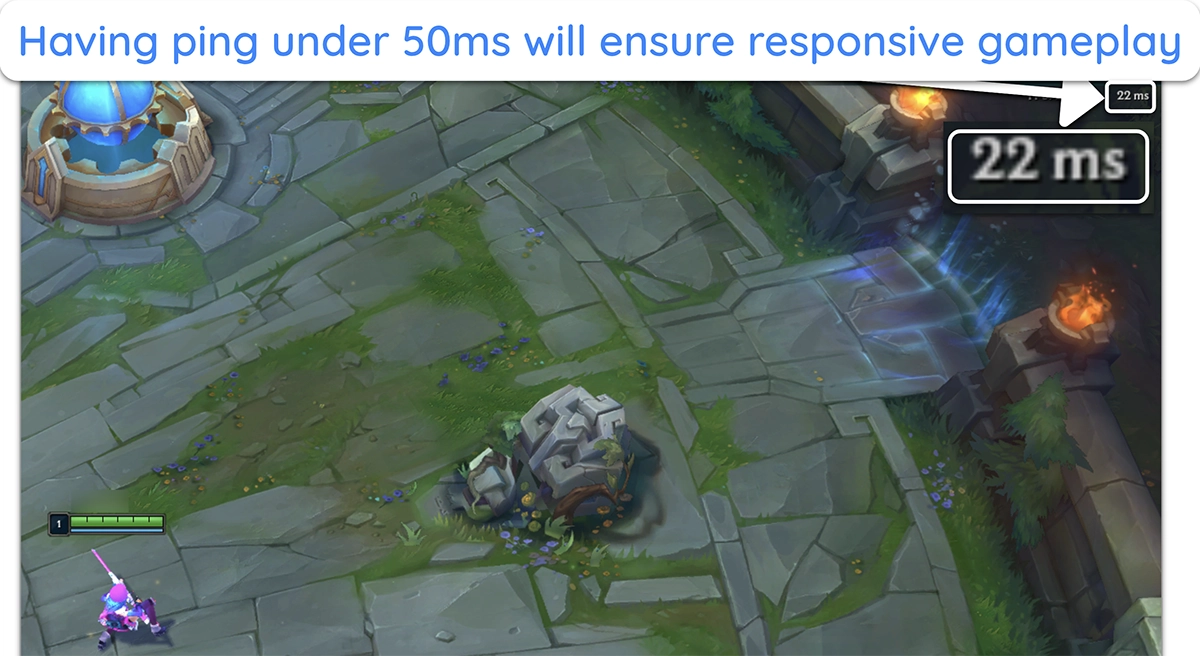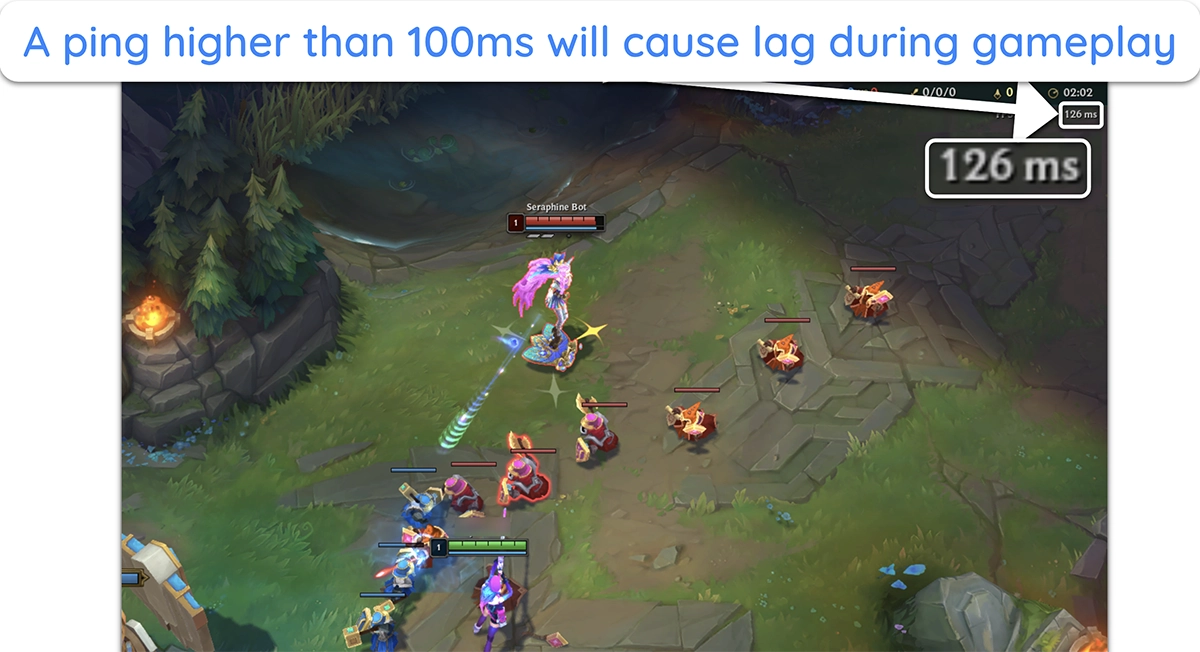What Is Ping and How It Can Affect Gaming: Full Analysis (2025)
Ping measures the time it takes for data to travel between your device and a server. It’s frequently confused with the ping command, which is used to troubleshoot connectivity issues. Another term for ping is latency, which is essentially the same thing. Keeping your ping low is crucial, or real-time tasks like gaming and video calls might start lagging.
Various factors affect ping, including distance to a server, network congestion, connection speed, and the routing your ISP uses. In this article, I’ve covered various tips you can follow to ensure you get the lowest possible ping, thus ensuring lag-free performance in games, video calls, and other real-time applications. Editor’s Note: We value our relationship with our readers, and we strive to earn your trust through transparency and integrity. We are in the same ownership group as some of the industry-leading products reviewed on this site: ExpressVPN, Cyberghost, Private Internet Access, and Intego. However, this does not affect our review process, as we adhere to a strict testing methodology.
Quick Summary: What Is Ping?
Simply put, ping is the time taken by a data packet to make a round trip between your device and a server. Measured in ms (milliseconds), it indicates the delay between the time you take an action and when it’s registered on the server.
What Is Ping? Detailed Explanation
Ping measures how long it takes for a data packet to travel from your device to a server and back. It’s measured in ms (milliseconds) and indicates how quickly data is exchanged in a network. A low ping means minimal delay, while a high ping indicates increased lag.
When you’re using a service on the internet or playing a game, data packets are constantly being exchanged between your device and the server. Ping measures the time these packets take to make a round-trip between your device and the server. Maintaining low ping is important, especially in real-time applications like the following:
- Gaming. A high ping while gaming will cause lag, noticeably increasing the time it takes to perform actions, putting you at a disadvantage.
- Video calling. Increased ping during video calls can cause disruptions, like noticeable delays between when you say something and when it’s heard on the opposite end.
Various factors affect ping, such as distance to a server, network load, connection speeds, and more. Maintaining a low ping ensures the best performance in online games and other real-time applications.
The Impact of Ping on Gaming
Ping significantly impacts gaming performance. Maintaining a low ping in online games is critical because you’re at a clear disadvantage against opponents otherwise.
The clearest example of this would be any shooter game. If you’re in a 1v1 fight against an opponent and both shoot simultaneously, the player with a lower ping will win every time, as their shot simply registers first. It’s even possible to fire before an opponent and still lose if there’s a significant ping difference between you two.
Ping also significantly affects MOBA games like League of Legends, where precise movements and actions are critical to staying in the lead. If you’re playing with a ping of 150ms, it adds a 0.15-second delay before any action you take gets registered. This makes it significantly harder to dodge enemy abilities or land your own.
What is Considered Good Ping for Gaming
If you like to play online games often, you might wonder what your ping should be to enjoy games without lagging or being at a competitive disadvantage. It varies based on the game, as a higher ping impacts some games more than others. However, a good ping in most cases would be under 50 ms.
At 50ms ping, it’s unlikely that you’ll experience lag during games. Your inputs will feel nearly instant, and you’ll be on a level playing field with your competitors. Of course, it’ll be even better if it’s lower, but any ping under 50ms is enough to ensure smooth gameplay without being disadvantaged.
Even the 50–100ms window is enough in many cases, as you’re unlikely to experience noticeable lag. The only instances where this would be problematic are high-ranked matches in shooting games like Counter: Strike 2, where the slightest ping differential could be the difference maker.
Note that any ping higher than 100ms will put you at a noticeable disadvantage. At 100ms, each input will take 0.1 additional seconds to go through. This might not sound like a lot, but it can be a deciding factor when playing online games like League of Legends or Call of Duty, where reactions and reflexes are critical.
Besides the competitive disadvantage, games start feeling sluggish when played at pings over 100ms. You’ll feel your character isn’t as responsive and doesn’t act as swiftly as your inputs.
How to Lower Your Ping
If you’re experiencing lag while gaming, there are various steps you can take to reduce ping, including the following:
- Choose a different server. If the game you’re playing allows manual server selection, consider choosing one close to you to reduce ping.
- Close background applications. Close any background applications like web browsers, as they may slow down your connection.
- Switch to a wired connection. Switching to a wired connection from WiFi can provide a more stable connection and reduced pings.
- Reduce network load. Disconnecting other devices on your network could reduce load and improve ping.
- Restart your router. Simply restarting your router could clear network clutter and lower ping.
- Use a VPN. VPNs can help reduce ping by preventing ISP throttling and optimizing connection routes.
Getting Lower Pings With a VPN
Using a VPN is among the top ways to ensure you have a low ping while gaming. Some ISPs have poor routing, meaning traffic takes longer paths to reach its destination, thus increasing ping. Also, ISPs may even throttle your connection, reducing your speeds and increasing your ping.
VPNs are effective at helping resolve these issues. Since they mask your activity, ISPs can’t see what you’re doing and throttle the connection. Plus, VPNs route all traffic through more efficient paths, potentially reducing the distance data needs to travel, thus reducing ping.
FAQs on Ping
What is the difference between ping and latency?
What is the difference between ping and jitter?
Does ping affect gaming performance?
Yes, ping significantly affects gaming performance. For instance, if you’re playing with 100ms ping, every action you take will occur 0.1 seconds after your input. So, if you play a shooter game at 100ms ping and fire a shot at the same time as an opponent with 50ms ping, your opponent would win that duel, as there’s less delay on their end.
What factors affect ping?
Various factors affect ping, including the following:
- Server distance. The distance between you and the server you’re communicating with directly impacts overall ping.
- Connection speed. Having a slow connection can lead to increased ping.
- Network congestion. Network congestion can cause increased ping or random spikes, which can hinder gaming performance.
- Server hardware. You may experience higher ping if the server you’re communicating with uses outdated hardware.
Keep Your Ping at a Minimum Using a Reliable VPN
In conclusion, keeping your ping low is essential to ensure smooth performance. While it might not affect basic tasks like streaming or web browsing, a high ping will cause issues with real-time activities like gaming and video calls.
Thankfully, the steps I’ve mentioned above should help reduce ping. Most of the suggested methods are effective, but using a VPN is one of the best ways to get lower pings. VPNs can drastically lower your ping by helping prevent ISP throttling and optimizing the route your data travels through to get to the server.







Leave a Comment
Cancel